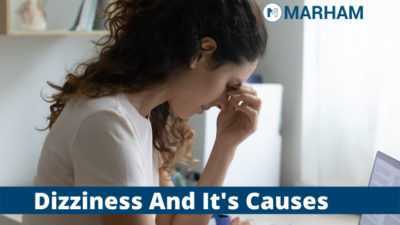Dizziness is the sensation of being off-center or off-kilter. It can cause fainting because it affects the senses, particularly the eyes and ears. Disease and dizziness aren’t the same things.
Vertigo and disequilibrium are two separate and distinct conditions that can cause dizziness. A spinning sensation is the characteristic symptom of vertigo and it feels as the room were spinning or moving.
Motion sickness or a swaying to one side are some possible symptoms. When there is an imbalance, we say there is a state of disequilibrium. Having a feeling of lightheadedness or near-fainting is true dizziness.
People often suffer from dizziness, but the cause is typically not significant. It’s not a big deal if you get a little dizzy now and then. If, on the other hand, you’ve been suffering dizziness on and off for a longer time without any apparent cause, you should consult the best Neurologist in Lahore right away.
Dizziness Meaning In Urdu:
Dadhawasi ek istalah hai jo ehsasaat ki ek had ko bayan krny k liye istemal hoti hai jaisy k Behoshi, Jhunjhulahat, Kamzori, ya Ghair Mustehkam mehsoos krna. Badhawasi ek ghalat ehsas paida krti hai k ap ya apka mahool ghoom rha hai.
What Are The Causes Of Dizziness?
“Dizzy” can imply different things to different people. Or, in certain cases, to the same person in different circumstances. It is most frequently used to describe one of the following sensations:
- Vertigo is the sensation of whirling around.
- Feeling faint or dizzy, as though about to pass out or fall.
- Loss of normal balance, i.e., feeling shaky but not faint or whirly.
When you go to the doctor and say you’re feeling “dizzy,” you’re putting them to the test. Because the term “dizzy” refers to various symptoms, a wide range of diseases can produce dizziness. On the other hand, your doctor should be able to narrow it down by finding out exactly what you mean by dizziness and asking about other symptoms.
Positional Vertigo With Benign Paroxysmal Recurrence (BPPV):
When you shift your head or body posture, you get dizzy from benign paroxysmal positional vertigo (like bending over). It normally lasts for a few seconds or minutes. This issue occurs when calcium crystals in your inner ear shifting out of place.


BPPV can be caused by a head injury or simply by getting older. The good news is that treatment is simple. Your healthcare professional might guide you through a simple operation known as canalith repositioning (CRP). These movements return the crystals to their original position.
Meniere’s Disease:
Meniere’s syndrome is characterized by an excess of fluid in the inner ear. Experts are baffled as to why it accumulates.
Meniere’s disease can affect anyone, but it is more frequent in 40 to 60. You may also encounter the following symptoms if you have Meniere’s syndrome:
- Loss of hearing.
- Hearing that is muffled or distorted.
- Vomiting and nausea
- Tinnitus (ringing in the ear).
Meniere’s attacks are usually unexpected, and they can last anywhere between 20 minutes and 24 hours. Anti-nausea and anti-vertigo medicines are among the treatment options. Lifestyle changes may also be beneficial, such as:
- Adhering to a low-salt diet.
- Caffeine and alcohol consumption should be limited.
- Medication substitution.
- Smoking cessation.
If your dizziness does not improve with modest therapy, your doctor may offer more treatments.
Infections of the ears:
Viral or bacterial ear infections can cause inflammation (irritation) in the inner ear, and the inflammation disrupts the messages sent by your inner ear to your brain.
The vestibulocochlear nerve, which runs through the inner ear, has two branches. Each branch connects with the brain in the following ways:
- The vestibular nerve transmits balance signals. Vestibular neuritis occurs when the vestibular nerve becomes irritated.
- The cochlear nerve transmits hearing signals. Labyrinthitis develops when inflammation affects the cochlear nerve as well. Ringing in the ears and hearing loss are also symptoms of labyrinthitis.
Medication to reduce nausea and dizziness is used in ear infection treatments. Antibiotics, antiviral drugs, and steroids may also be required.
Symptoms Of Dizziness:
Dizziness can cause a variety of different symptoms, some of which include:
- An unsteady feeling of lightheadedness or faintness.
- A sense of shakiness or disorientation.
- Dizziness might be accompanied by nausea, vomiting, or even fainting.
If you’ve been experiencing these symptoms for a lengthy period, see a physician.
Treatment For Dizziness:
Treatment options for dizziness and vertigo are as diverse as the conditions they are meant to treat. An audiologist can help establish the source of dizziness and the best course of action for treatment; therefore, your healthcare physician may send you to an audiologist.


An ear infection may only necessitate anti-nausea medicine for a short time. If your issue is long-term (chronic), your doctor may suggest vestibular therapy. Physical therapy-like exercises are used to help you improve your balance.
Related: 6 Reasons To Visit An Audiologist
How to Prevent Dizziness?
Sit or lie down immediately if you begin to feel dizzy. Your risk of falling is reduced by doing this. Lie down in a dark and quiet room with your eyes closed if you have vertigo. If you’re feeling dizzy because you’re dehydrated, drinking water could help.
- Following are the things to avoid if you’ve been experiencing dizziness regularly.
- Remove rugs from the floor and other tripping hazards from your home to reduce your risk of injury.
- Avoid or move more slowly around items that make you dizzy, such as bright lights, loud noises, and quick movement.
Book an appointment now to answer all your queries. You can book an appointment with the top Neurologist in Lahore through Marham by calling the Marham helpline: 0311-1222398 or online booking facility through the website or Marham mobile app.
Can’t Find The App?
| Android | IOS |
|---|---|
  |
  |
Frequently Asked Questions (FAQs)
1- How can I reduce dizziness?
When dizzy, sit or lie down immediately. If you have severe vertigo, lie still with your eyes closed in a dim room. Avoid driving or using heavy machinery if you have regular dizziness.
2-Can high BP cause dizziness?
High blood pressure can cause a pounding in the head or chest, lightheadedness or vertigo, or other symptoms.
3-What is the most common cause of dizziness?
The most common causes include benign paroxysmal positional vertigo (BPPV), Meniere’s syndrome, and ear infections.

